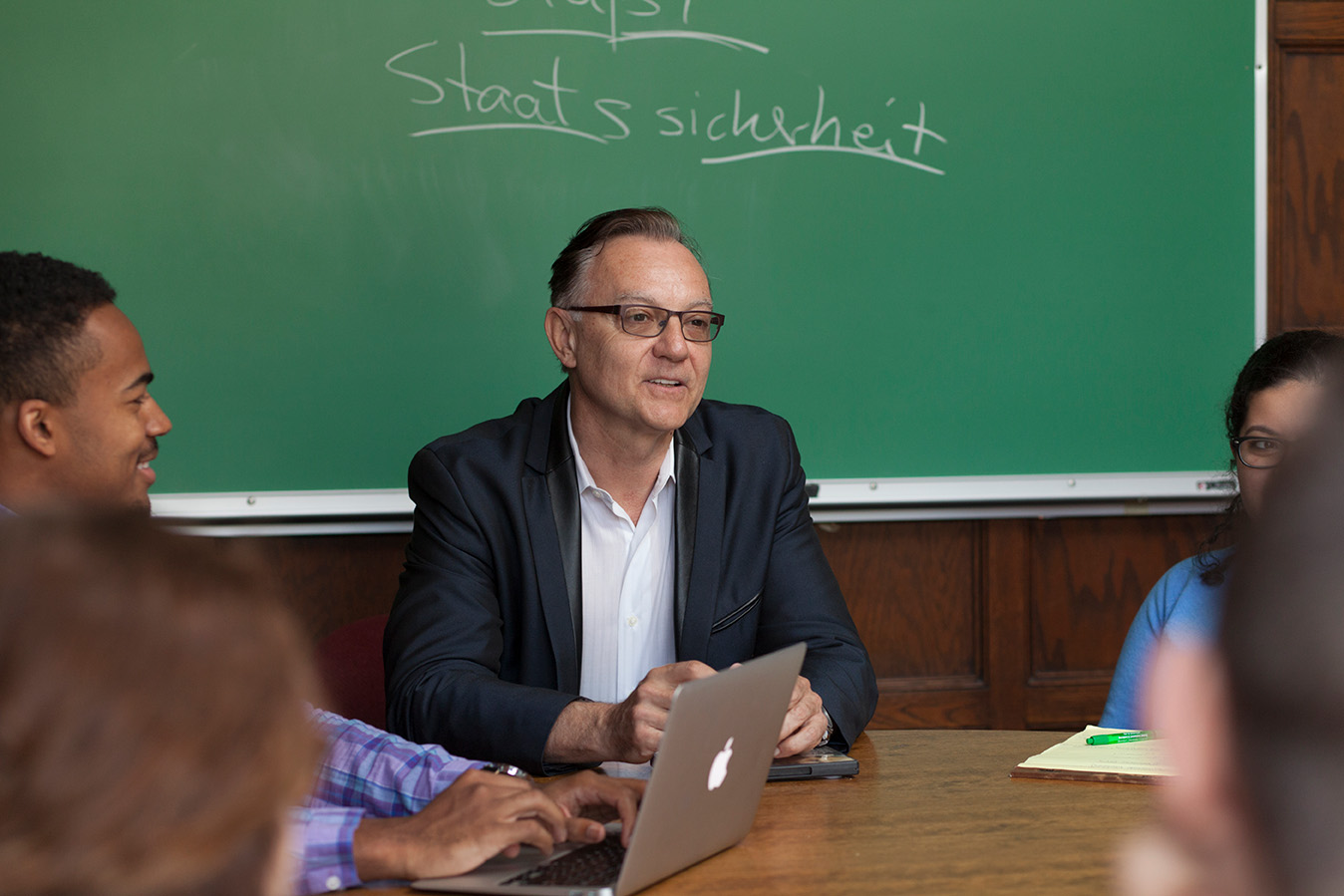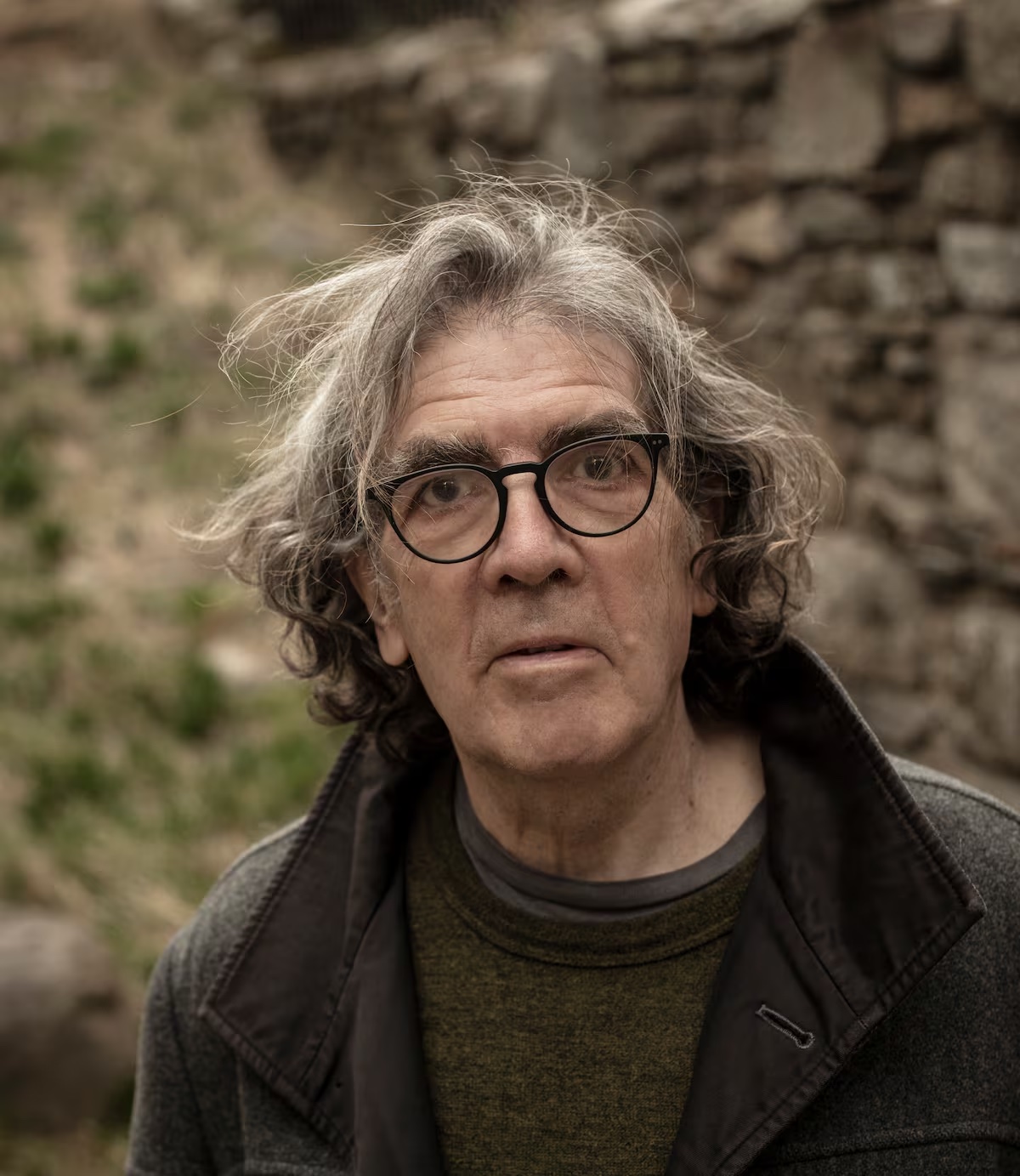Filed under:
With admiration and deep appreciation, Sarah Lawrence celebrates three long-serving faculty members who retired this year. Their work has touched countless lives and helped define the Sarah Lawrence experience for students and colleagues alike. In May, the Board of Trustees conferred Faculty Emeritus status onto them in recognition of their distinguished careers and their substantial contributions to our community.
Roland Dollinger (German and Literature, 1989-2025)
 Roland is deeply committed to literature as both a scholarly and personal pursuit. With degrees from the University of Pittsburgh and Princeton, his career is rooted in rigorous inquiry, intellectual generosity, and a collaborative spirit.
Roland is deeply committed to literature as both a scholarly and personal pursuit. With degrees from the University of Pittsburgh and Princeton, his career is rooted in rigorous inquiry, intellectual generosity, and a collaborative spirit.
Roland’s teaching spans exile literature, postwar German film, and philosophy — often returning to the question of what it means to live meaningfully. His students speak of him as a mentor who treats each conference as a true dialogue. Theo Kosoff ’23 writes, “It was in such moments that I learned why I love literature: because of the human relationships that are made possible in the production of thought.”
Roland’s impact extends beyond the classroom. He helped found and lead international summer programs in Berlin and New York, invited colleagues from across disciplines to join his classes, and organized talks that brought students into global conversations — including a 2022 event with scholars from war-torn Ukraine. Melissa Frazier notes that Roland's “spirit of experimentation and intellectual collaboration” is matched by his “kindness and laughter.”
In retirement, Roland plans to travel and to continue his research on exile. His legacy of close reading, critical questioning, and community will continue to shape the College for years to come.
Eduardo Lago (Spanish and Literature, 1993-2025)
 Eduardo embodies the rare union of scholarly depth and literary imagination. A novelist, translator, journalist, and professor, Eduardo brought to the College a profound commitment to language in all its complexity. His first novel, Call Me Brooklyn, won Spain’s most prestigious literary award, Premio Nadal, and was translated into 18 languages. It marked the beginning of an acclaimed literary career that includes fiction, essays, and translations of major American writers into Spanish.
Eduardo embodies the rare union of scholarly depth and literary imagination. A novelist, translator, journalist, and professor, Eduardo brought to the College a profound commitment to language in all its complexity. His first novel, Call Me Brooklyn, won Spain’s most prestigious literary award, Premio Nadal, and was translated into 18 languages. It marked the beginning of an acclaimed literary career that includes fiction, essays, and translations of major American writers into Spanish.
With a PhD from CUNY and an MA from Universidad Autónoma de Madrid, Eduardo taught courses that bridged continents and cultures — linking Spanish, Latin American, US Latinx, and European literatures. His “In the Newsroom” course sent students across New York City, transforming classroom theory into real-world storytelling. “Everything I do, I do as a writer,” he reflects. “I bring that sensibility to my students, who change me all the time. They are pure souls.”
Eduardo’s influence extended beyond the classroom. As Director of the Cervantes Institute in New York, he fostered cultural dialogue across disciplines and borders. “My only country is my language,” he said — a statement that encapsulates his devotion to the written word and the transformative power of literature.
Fellow faculty member and poet Vijay Seshadri calls him “a thinker and writer down to his bones,” someone who “enacts civilization in his most quotidian encounters.” Lago leaves behind a legacy of intellectual rigor, artistic passion, and an indelible mark on generations of students.
Thomas Young (Music faculty, 1989-2025)
 Already an internationally acclaimed performer when he joined the Sarah Lawrence faculty, Thomas brings a deep commitment to vocal mastery and emotional expression to the classroom. His career spans over 40 countries, from the San Francisco Opera and Covent Garden to jazz venues alongside legends such as Tito Puente and Nancy Wilson. It was the stability and artistic integrity of teaching — and the extraordinary community at SLC — that drew him to the College.
Already an internationally acclaimed performer when he joined the Sarah Lawrence faculty, Thomas brings a deep commitment to vocal mastery and emotional expression to the classroom. His career spans over 40 countries, from the San Francisco Opera and Covent Garden to jazz venues alongside legends such as Tito Puente and Nancy Wilson. It was the stability and artistic integrity of teaching — and the extraordinary community at SLC — that drew him to the College.
Teaching forced him to codify his ideas: “You have to really understand and embody something to teach it.” His studio, Room 3 of Marshall Field, became a space where technical rigor met emotional truth. Known for his dedication to each student’s unique voice, he helped them navigate the complexities of language, narrative, and identity. “Art succeeds or fails emotionally,” he says. “At any moment, you can be changed by it.”
Thomas reflects on teaching as an act of faith — planting seeds without knowing which will take root. “Students are figuring out who they are. If I do my job well, I can help.” He leaves with gratitude for his colleagues’ artistry and passion and a renewed sense of purpose: to continue sharing his knowledge through masterclasses and mentorship.
As he steps away from day-to-day teaching, Thomas remains committed to the lifelong journey of song. “It’s hard to quantify what 36 years of teaching means,” he says, “but I look forward to discovering that meaning.”